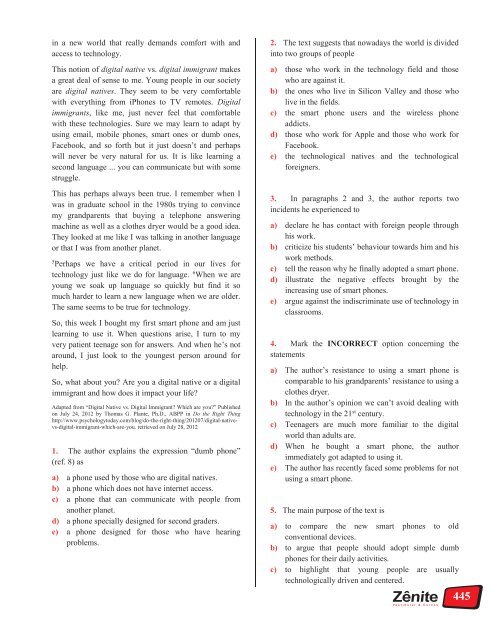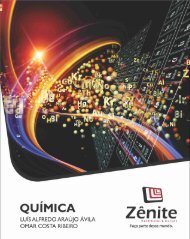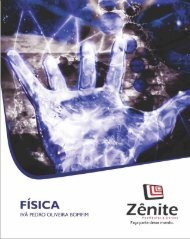- Page 3 and 4:
INGLÊS 3
- Page 5:
Todo livro tem sua história. Este
- Page 9 and 10:
CAPÍTULO I - PRONOMES PESSOAIS Pro
- Page 11 and 12:
EXERCISES go on. - Adaptado de: htt
- Page 13 and 14:
to best prepare me for the upcoming
- Page 15 and 16:
10. O pronome “it” em “It wil
- Page 17 and 18:
15. The pronouns "it" (ref. 6) and
- Page 19 and 20:
CAPÍTULO II - PRONOMES POSSESSIVOS
- Page 21 and 22:
3. The pronoun “her” (line 3) a
- Page 23 and 24:
more on the microeconomic reforms t
- Page 25 and 26:
CAPÍTULO III - PRONOMES REFLEXIVOS
- Page 27 and 28:
It is an old saying that "Order is
- Page 29 and 30:
CAPÍTULO IV - PRONOMES INTERROGATI
- Page 31 and 32:
1. No texto 1, 2º quadrinho, qual
- Page 33 and 34:
e) ____________ is your best friend
- Page 35 and 36:
CAPÍTULO IV - PRONOMES INDEFINIDOS
- Page 37 and 38:
One important field in which the la
- Page 39 and 40:
5. (Unitau) Assinale a alternativa
- Page 41 and 42:
11. (Uel) Assinale a alternativa qu
- Page 43 and 44:
A KEY HURDLE: THE ENGLISH TEST Most
- Page 45 and 46:
CAPÍTULO VI - PRONOMES DEMONSTRATI
- Page 47 and 48:
Survey of Family Growth, relating t
- Page 49 and 50:
NOT SO PERFECT AFTER ALL For the pa
- Page 51 and 52:
inflation is in low single digits.
- Page 53 and 54:
possessions and, yes, their cleanli
- Page 55 and 56:
16. The word THIS in "with this inf
- Page 57 and 58:
whom they trust, who takes the time
- Page 59 and 60:
e) euphoric reward responses. TO BL
- Page 61 and 62:
8. A palavra THAT (ref. 1) poderá
- Page 63 and 64:
11. The word "which" (ref.2) can be
- Page 65 and 66:
growth is surgically removed. (Time
- Page 67 and 68:
Brazil is setting up Telecenters. T
- Page 69 and 70:
ultimate horrors (real and imaginar
- Page 71 and 72:
Although great variety in dramatic
- Page 73 and 74:
CAPÍTULO VIII - RECIPROCAL PRONOUN
- Page 75 and 76:
Examples: Usando apóstrofos para P
- Page 77 and 78:
Texto 1: Teen depression Depression
- Page 79 and 80:
c) Did you know that the nationalit
- Page 81 and 82:
1. She considers the job done. - (A
- Page 83 and 84:
ATENÇÃO: Esses advérbios devem s
- Page 85 and 86:
The sun goes down, He takes the day
- Page 87 and 88:
difference that will be at the orig
- Page 89 and 90:
We drink too much, smoke too much,
- Page 91 and 92:
pleasure of writing and receiving l
- Page 93 and 94:
change. The Communist country encou
- Page 95 and 96:
8. Assinale a alternativa que apres
- Page 97 and 98:
ATENÇÃO: 1. Observe que os verbos
- Page 99 and 100:
Anyone can contract the illness, th
- Page 101 and 102:
101
- Page 103 and 104:
EXERCISES In the summer of 1926, an
- Page 105 and 106:
CAPÍTULO XIV - THE PRESENT & PAST
- Page 107 and 108:
c) actions occurring at a specified
- Page 109 and 110:
Com base nas asserções, assinale
- Page 111 and 112:
15. A frase "I NEVER CAME ACROSS SU
- Page 113 and 114:
c) They have finished their assignm
- Page 115 and 116:
todos expressões temporais que pod
- Page 117 and 118:
NOTE: Quando estamos usando este te
- Page 119 and 120:
- Children may be more fearful of t
- Page 121 and 122:
The Teacher's magazine The dramatic
- Page 123 and 124:
CAPÍTULO XV - GERUND & PRESENT PAR
- Page 125 and 126:
2. The group of words from text whi
- Page 127 and 128:
York. Michael Gold (1896-1967), edi
- Page 129 and 130:
GRAND THEFT IDENTITY Millions of pe
- Page 131 and 132:
Major industries such as electronic
- Page 133 and 134:
CAPÍTULO XVI - VERBOS ANÔMALOS (M
- Page 135 and 136:
Como o modal CAN tem sempre signifi
- Page 137 and 138:
Rio de Janeiro, Brazil, in June 201
- Page 139 and 140:
aspirin will temporarily ease heada
- Page 141 and 142:
which previous generations would ha
- Page 143 and 144:
1. The modals COULD, MIGHT and MAY
- Page 145 and 146:
) os índios e sua arte desaparecer
- Page 147 and 148:
nós. (Nota: Quando colocam pergunt
- Page 149 and 150:
THE LEGEND OF THE CRYSTAL SKULLS Th
- Page 151 and 152:
Recent advances in human embryology
- Page 153 and 154:
THE WORST OF BOTH WORLDS? In the gl
- Page 155 and 156:
c) Probability - obligation. d) Pro
- Page 157 and 158:
algo de uma maneira mais polida, ma
- Page 159 and 160:
Usamos o future perfect para falar
- Page 161 and 162:
1. In the sentence “A political s
- Page 163 and 164:
Brazilians live. They shouted throu
- Page 165 and 166:
1. Futuro Possível IF CLAUSE Prese
- Page 167 and 168:
6. The word WHETHER in "...whether
- Page 169 and 170:
11. Indique a alternativa que preen
- Page 171 and 172:
17. Considere a imagem a seguir PAR
- Page 173 and 174:
In Taiwan, good food is never hard
- Page 175 and 176:
CAPÍTULO XX - SUBSTANTIVOS Substan
- Page 177 and 178:
Exemplos: doctor - médico / médic
- Page 179 and 180:
video virtuoso videos (vídeos) vir
- Page 181 and 182:
stairs surrondings thanks escada(s)
- Page 183 and 184:
2 ‘ 3 We saw a programme on telev
- Page 185 and 186:
12. Which alternative shows the cor
- Page 187 and 188:
CAPÍTULO XXI - ADJECTIVES - GRAU D
- Page 189 and 190:
fierceness, in my journeys among th
- Page 191 and 192:
9. Coloque os adjetivos entre parê
- Page 193 and 194:
3. Complete com o Comparativo de Ig
- Page 195 and 196:
that propelled the recent recovery.
- Page 197 and 198:
9. The only alternative which DOES
- Page 199 and 200:
4. Os sufixos das palavras HIGHEST,
- Page 201 and 202:
) Comparação Gradual: Neste caso
- Page 203 and 204:
that human beings will be incapable
- Page 205 and 206:
CAPÍTULO XXII - ADVERBS O que é u
- Page 207 and 208:
Diferenças entre comment/viewpoint
- Page 209 and 210:
Adjetivo ou Advérbio? - Adjective
- Page 211 and 212:
pace compatible with UN targets for
- Page 213 and 214:
And it happens all the time. We hav
- Page 215 and 216:
One day, the rose-tree flowered, an
- Page 217 and 218:
Mar. 2004. 12. The phrase BY THE TI
- Page 219 and 220:
CAPÍTULO XXIV - DIRECT & REPORTED
- Page 221 and 222:
Changing Pronouns and Time Signifie
- Page 223 and 224:
e) Warren said to me that he could
- Page 225 and 226:
The IPCC adopted the report, along
- Page 227 and 228:
For example: She asked, "Do you wan
- Page 229 and 230:
ROMANCE. TOWARD THE END OF THE BOOK
- Page 231 and 232:
IN SURVEY AFTER SURVEY, MANY KIDS -
- Page 233 and 234:
CAPÍTULO XXV - PASSIVE VOICE -VOZ
- Page 235 and 236:
the world. These include, for examp
- Page 237 and 238:
elationships and recommendations, r
- Page 239 and 240:
certain crimes, Mr. Barbosa publicl
- Page 241 and 242:
EXERCISES: Present Perfect. Voz Ati
- Page 243 and 244:
That's why representatives of more
- Page 245 and 246:
a) A low level of English in Englis
- Page 247 and 248:
A new supermarket is being built tw
- Page 249 and 250:
- O uso de get em construções pas
- Page 251 and 252:
Quando o sujeito de uma tag questio
- Page 253 and 254:
a) doesn't b) do c) did d) does e)
- Page 255 and 256:
Everybody but Robert is trying out
- Page 257 and 258:
Joey was a pretty girl with long br
- Page 259 and 260:
which languages have died in the pa
- Page 261 and 262:
ever-changing life. They are 1 hot
- Page 263 and 264:
How can consumers find out if a cor
- Page 265 and 266:
26. The variant sentences for "It's
- Page 267 and 268:
HOWEVER / NONETHELESS / NEVERTHELES
- Page 269 and 270:
You can ask for help whenever you n
- Page 271 and 272:
4. The linking word “thus” in t
- Page 273 and 274:
those of the best European schools
- Page 275 and 276:
Unfortunately, this type of memory
- Page 277 and 278:
metal artifacts. Archeologists have
- Page 279 and 280:
of the plague, and it was during th
- Page 281 and 282:
Por exemplo:- I went swimming, alth
- Page 283 and 284:
even if otherwise Time Sequence/Nar
- Page 285 and 286:
Development (desenvolvimento) - do
- Page 287 and 288:
Computerize (computadorizar) - do s
- Page 289 and 290:
1. O prefixo fore- é acrescentado
- Page 291 and 292:
THE SUFFIX - OUS Este sufixo forma
- Page 293 and 294:
He says that Rio's authorities are
- Page 295 and 296:
Mr. Eugene Foster lives with his wi
- Page 297 and 298:
10. Choose the alternative that con
- Page 299 and 300:
Along - ao longo de, junto com The
- Page 301 and 302:
EXERCISES 2. Buses for the future I
- Page 303 and 304:
4. Read the passage below. Jackie T
- Page 305 and 306:
to develop the sense of where the "
- Page 307 and 308:
13. The word "since" (ref. 1) conve
- Page 309 and 310:
other industrial countries, like th
- Page 311 and 312:
machine". Thousands of visitors, in
- Page 313 and 314:
CAPÍTULO XXX - PHRASAL VERBS & PRE
- Page 315 and 316:
uma proposta, etc. run down - atrop
- Page 317 and 318:
go with - cair bem, combinar com go
- Page 319 and 320:
fazer nada hang up - desligar o tel
- Page 321 and 322:
you looking at?") ou relativas ("Th
- Page 323 and 324:
VERBO SIGNIFICADO TIPO EXEMPLO Do a
- Page 325 and 326:
Get away Sair de férias Inseparáv
- Page 327 and 328:
Go back to sth Go for sb/sth Voltar
- Page 329 and 330:
Look down on sb/sth Look forward to
- Page 331 and 332:
Run over sth Sell out (of sth) Send
- Page 333 and 334:
Turn sthoff Turn sthon Turn over /
- Page 335 and 336:
The key stat is right there in the
- Page 337 and 338:
6. Mark the correct alternative. Th
- Page 339 and 340:
pleasers. [...] From: Archaeology.
- Page 341 and 342:
in this year's nationals). U.S. tea
- Page 343 and 344:
21. The verb "to go" may be followe
- Page 345 and 346:
( ) The author's excellent approach
- Page 347 and 348:
dig lt du g dug espalhar; negociar
- Page 349 and 350:
shin e sho ne shone projetar brilha
- Page 351 and 352:
a) c) d) b) 351
- Page 353 and 354:
Com base no texto, considere as afi
- Page 355 and 356:
Text 11. 1. Read the cartoon. b) Ma
- Page 357 and 358:
portable, affordable, effective and
- Page 359 and 360:
a) constrange e intimida o garçom,
- Page 361 and 362:
Text 28. 1. How’s your mood? d) e
- Page 363 and 364:
Text 32. 1. In the story above, Gar
- Page 365 and 366:
Text 38. 1. Leia as seguintes placa
- Page 367 and 368:
Snoopy seems to realize that a) he'
- Page 369 and 370:
According to the newspaper page: a)
- Page 371 and 372:
Cartuns são produzidos com o intui
- Page 373 and 374:
5. De acordo com o texto, em 1983 a
- Page 375 and 376:
Quais propostas estão corretas, de
- Page 377 and 378:
Text 67. Text 69. 1. Choose the cor
- Page 379 and 380:
1. Na fase escolar, é prática com
- Page 381 and 382:
A partir da leitura dessa tirinha,
- Page 383 and 384:
Text 84. 1. c) Garfield considers h
- Page 385 and 386:
c) quantifica a generalização exp
- Page 387 and 388:
The response was amazing. Before I
- Page 389 and 390:
3. Sea levels are not likely to be
- Page 391 and 392:
c) assuntos que devem ser discutido
- Page 393 and 394: Movie Info c) “Jobs” and “Lee
- Page 395 and 396: III. So when your wife goes window-
- Page 397 and 398: 3. Com base na charge e na notícia
- Page 399 and 400: A recent multicenter study found th
- Page 401 and 402: propagation. (Some drugs subvert th
- Page 403 and 404: ecruitment of child soldiers is ram
- Page 405 and 406: Text 113. The Man Who Sold the Eiff
- Page 407 and 408: native fl oral resources, particula
- Page 409 and 410: 8. According to the information in
- Page 411 and 412: Text 118. How money works: Will Chi
- Page 413 and 414: 1. De acordo com o texto, o aumento
- Page 415 and 416: 2. From the statement “Elinor is
- Page 417 and 418: development, shipping, coastal aqua
- Page 419 and 420: 3. Em qual das alternativas a segui
- Page 421 and 422: I don’t understand Why do I stres
- Page 423 and 424: And bring no 1 pain, nor 2 fear. Di
- Page 425 and 426: Korean culture has flourished over
- Page 427 and 428: Give us a sign that we’ve reached
- Page 429 and 430: 1. Os vários questionamentos prese
- Page 431 and 432: 1. Considering the lyrics of the so
- Page 433 and 434: d) acontece em escolas de periferia
- Page 435 and 436: Text 147. A TRIBUTE TO MARTIN LUTHE
- Page 437 and 438: Text 150. Imagine John Lennon Imagi
- Page 439 and 440: 1. Letras de músicas abordam temas
- Page 441 and 442: Text 156. Information about where t
- Page 443: 1. O filme Hijras - The Third Gende
- Page 447 and 448: d) anúncios devem conter um apelo
- Page 449 and 450: Cetaceans: Whales and Dolphins. Thi
- Page 451 and 452: d) as gals sobrevivem das tendênci
- Page 453 and 454: Text 174. Ecotourist: What type are
- Page 455 and 456: “ 9 People really cannot make hea
- Page 457 and 458: 2. No terceiro parágrafo, o pronom
- Page 459 and 460: d) use their parents’ federal inc
- Page 461 and 462: Diversity and Inclusion. Every one
- Page 463 and 464: Text 187. 1. (Enem 2012) Leia. I, t
- Page 465 and 466: 21. (Enem 2ª aplicação 2010) - T
- Page 467 and 468: stabilized in previous studies, and
- Page 469 and 470: 05) The bad effects of the sex gap
- Page 471 and 472: “The prices are rising precisely
- Page 473 and 474: “Philip Cohen, author of the upco
- Page 475 and 476: arely so accessible for exploration
- Page 477 and 478: 04) Paragraph3 / Paragraph1 / Parag
- Page 479 and 480: 02. About GLM company, the only pie
- Page 481 and 482: 02) evaluating English teachers all
- Page 483 and 484: The reserve is devoted to China’s
- Page 485 and 486: 01. About the fuel made by FoST, it
- Page 487 and 488: d) Laptop and desktop revival. e) T
- Page 489 and 490: Unlike humans, wild animals can per
- Page 491 and 492: 01. The man in this cartoon a) is p
- Page 493 and 494: 05) He did badly at his qualifying
- Page 495 and 496:
2. The main purpose of the present
- Page 497 and 498:
Considering their views about susta
- Page 499 and 500:
Text 231. It may be unfair to blame
- Page 501 and 502:
(10) though it remains to be seen h
- Page 503 and 504:
6 The only alternative that does no
- Page 505 and 506:
04) Until now. 05) Not anymore. 6
- Page 507 and 508:
4. The only alternative in which th
- Page 509 and 510:
Curitiba 01) has made a few mistake
- Page 511 and 512:
than their mothers took care of the
- Page 513 and 514:
( ) the audio record is the last th
- Page 515 and 516:
515

















